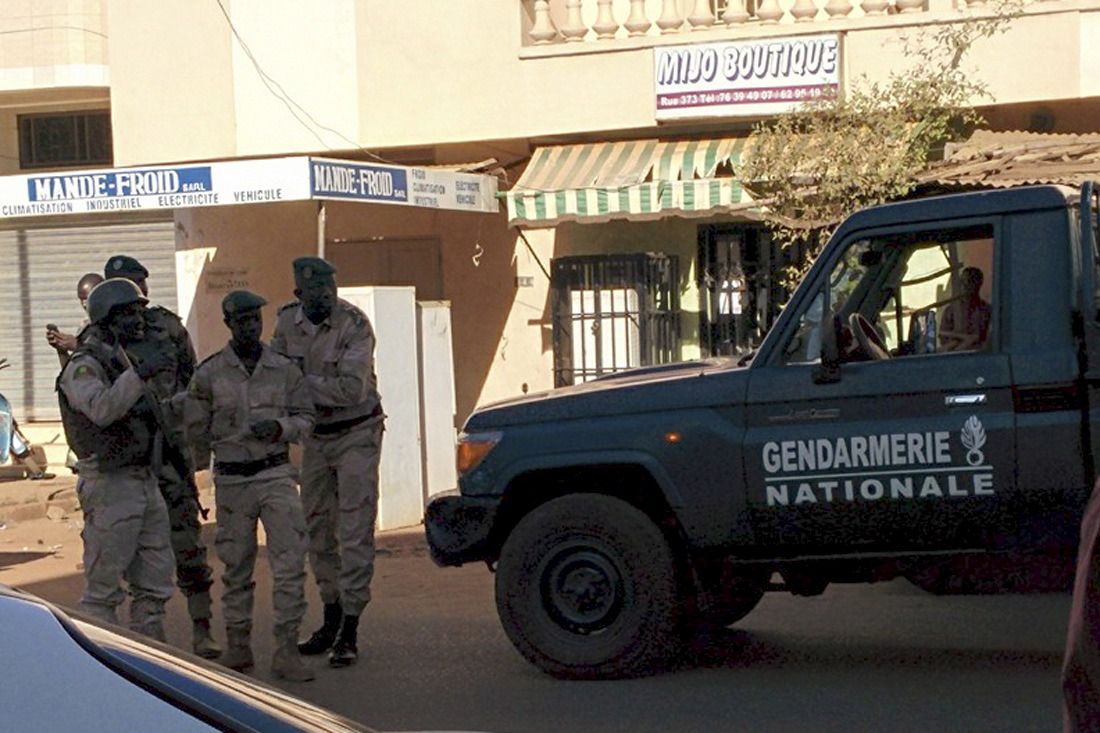
Updated | At least 27 people are reportedly dead after Malian and French special forces stormed a hotel in the capital of the West African nation on Friday and killed two gunmen while attempting to free up to 170 hostages. An Islamist militant group has claimed it was jointly responsible for the attack.
The gunmen in Bamako are holding "no more hostages," a Malian security minister said, according to the AFP news agency, as French and Malian forces continue their operation inside the Radisson Blu hotel. Reuters reported that the security ministry said gunmen continued to hold out against special forces on the top floors of the seven-floor building.
The U.N. is reporting that 27 have been killed, according to Reuters. Mali's interior minister, Salif Traore, said earlier on Friday that troops had freed 30 hostages and that two soldiers have been wounded, though not fatally. Reuters reported that six Americans were among those freed.
The owner of the luxury hotel, the Brussels-based Rezidor Hotel Group, said early Friday that two gunmen took 140 guests and 30 employees hostage. One senior security source later told Reuters that up to 10 militants entered the building and that they were shouting "Allahu akbar" ("God is great").
The employer of Belgian national and local government official Geoffrey Dieudonne said he was among those killed in the attack. Seydou Dembele, the head of security at the U.S.-owned hotel—which is near several government ministries—said the gunmen shot two of his guards in the legs.
An Al-Qaeda-affiliated militant group, Al-Mourabitoun, claimed it was jointly responsible for the attack along with Al-Qaeda in the Islamic Maghreb (AQIM), Mauritania's Alakhbar news agency said, according to Reuters.
According to Rita Katz, the founder of U.S.-based jihadi monitoring company SITE Intelligence, Al-Qaeda supporters celebrated the hotel attack online, saying that the Islamic State militant group (ISIS) "should learn a thing or two."
France sent 50 paramilitary police to assist in the rescue of the hostages, the BBC reported. They reached the Radisson on Friday afternoon, the French defense ministry said. The Pentagon said U.S. special forces were helping to secure the scene of the attack, and the U.S. military said that the troops helped to rescue at least six American nationals, the AFP news agency reported.
Eyewitnesses reported hearing gunfire from the hotel, around which security forces set up a cordon. Tamba Diarra, an employee at the hotel, said the attackers also used grenades, the Associated Press reported.
According to Reuters, the militants released hostages who were able to recite verses from the Koran. Malian media reported that only three people were freed—all of whom could recite the Shahada, an Islamic declaration of faith.
Those still in the building are of several different nationalities. A French presidential source told Reuters that French nationals were among those held. "We are still awaiting more precise information that's been checked out," the source said. "French people are present. The president is following the situation closely." Air France, which had 12 employees trapped in the hotel, said all are now free.
Seven employees of Turkish Airlines were also guests in the hotel, which is popular with airline staff and business professionals. So far, five of these hostages have escaped, a spokesman for the company said.
Twenty Indian nationals and up to 10 Chinese people were also in the hotel, according to the BBC. A representative of a U.N. peacekeeping force that is supporting the operation said Malian security forces are currently sweeping the hotel floor by floor in a bid to free the captives. The country's interior minister told reporters that troops sealed off all exit points from the hotel.
The U.S. Embassy in Bamako tweeted that all U.S. citizens in the area should take shelter, contact their families and monitor local media for updates.
In August, Al-Mourabitoun claimed responsibility for another hotel siege in the central Malian city of Sevare, killing 17 people. During that attack, 17 people, among them U.N. staffers, were killed. The militant group also claimed to be behind a March restaurant attack in Bamako that killed five people, as well as a suicide-bomb attack on U.N. peacekeepers in northern Mali in April that left three people dead.
Al-Mourabitoun pledged allegiance to ISIS in May, but its leader, Mokhtar Belmokhtar, renounced the pledge just a day later. Former Al-Qaeda militant Belmokhtar, an Algerian national, founded the group in 2013.
The Mali attack comes a week after gunmen carried out a wave of assaults in Paris that left 129 people dead, which ISIS claimed responsibility for. Mali is a former French colony, and France maintains a military presence in the country.
Malian President Ibrahim Boubacar Keita cut short a regional summit meeting in Chad to return home following news of the attacks, according to his official Facebook page. French President François Hollande said France will once again "stand firm and show [its] solidarity with a friendly country, Mali."
The August assault was not a first for Mali, which has been beset with instability and violence dating back to March 2012. Then, militants from Al-Qaeda in the Maghreb, the group's North African branch, overran areas of the country's north and threatened to march on Bamako before a French-led force gradually pushed them back.
In the ensuing years, militants have continued to carry out attacks in the country, where French and Malian troops protect the country's major cities. Approximately 1,000 French troops remain in the country.
This is a developing news story and will be updated as more information becomes available.
Uncommon Knowledge
Newsweek is committed to challenging conventional wisdom and finding connections in the search for common ground.
Newsweek is committed to challenging conventional wisdom and finding connections in the search for common ground.
About the writer
Jack is International Security and Terrorism Correspondent for Newsweek.
Email: j.moore@newsweek.com
Encrypted email: jfxm@protonmail.com
Available on Whatsapp, Signal, Wickr, Telegram, Viber.
Twitter: @JFXM
Instagram: Read more
To read how Newsweek uses AI as a newsroom tool, Click here.








